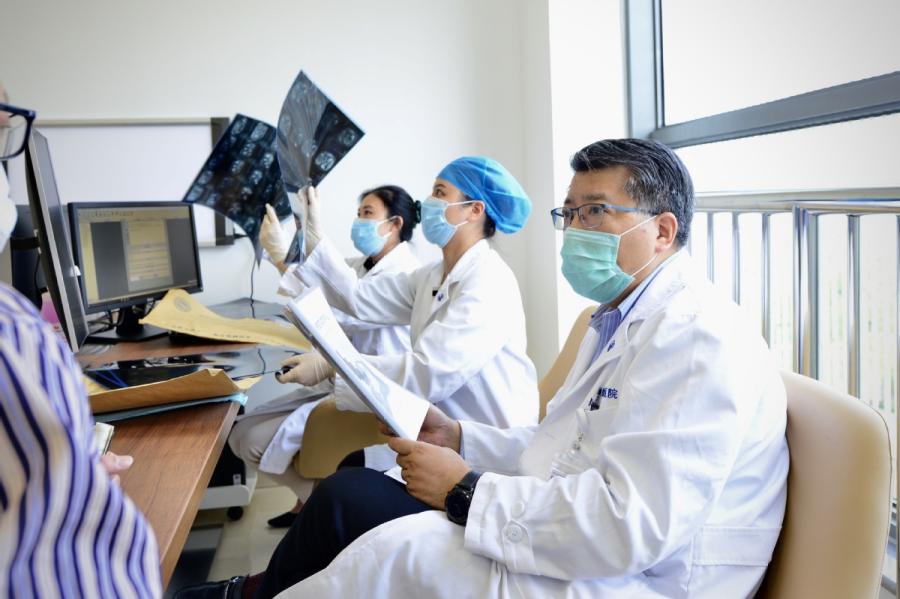 Shao Zhimin (right), director of general surgery and breast surgery departments of the Fudan University Shanghai Cancer Center and leader of the clinical study, is working on a patient case. [Photo provided to chinadaily.com.cn]
Shao Zhimin (right), director of general surgery and breast surgery departments of the Fudan University Shanghai Cancer Center and leader of the clinical study, is working on a patient case. [Photo provided to chinadaily.com.cn]
Shanghai medical experts have devised a neoadjuvant treatment approach for triple-negative breast cancer, the most dangerous type of breast cancer, significantly boosting the pathological complete response (PCR) rate from 44.7 percent to 56.8 percent.
This innovative method not only aids in shrinking tumors before surgery but also extends patient survival, experts from the Fudan University Shanghai Cancer Center who led this phase III clinical study said on Tuesday.
In this study involving 441 breast cancer patients at 40 clinical centers across China, the researchers combined traditional chemotherapy with a novel Chinese-developed immunotherapy drug.
PCR means complete disappearance of invasive cancers in the breast and the axillary lymph nodes after neoadjuvant treatment, which includes chemotherapy before surgery. Experts explained that patients achieving PCR have a significantly better prognosis compared to those who do not, with reduced risk of recurrence and extended disease-free survival.
Key findings of the clinical study were published in the Journal of the American Medical Association on Friday. It marked the first publication in the journal’s 141-year history regarding a research on an original breast cancer medicine based on data from the Chinese population.
Triple-negative breast cancer accounts for 10 percent to 20 percent of all new breast cancer cases, and is known for its high risk of recurrence and aggressive nature. Early recurrence is common, and once the cancer recurs or metastasizes, the prognosis is poor.
For early or locally advanced triple-negative breast cancer patients, neoadjuvant chemotherapy is typically administered before surgery to reduce tumor size, said doctors.
Researchers internationally have been exploring the integration of immunotherapy into chemotherapy regimens to enhance PCR rate in recent years. However, large-scale studies so far are based primarily on Western populations and usually exclude patients with more lymph node metastases.
“The medicine Camrelizumab, a high-efficiency PD-1 immune checkpoint inhibitor, used in our clinical research is developed by Jiangsu Hengrui Pharmaceuticals Co Ltd. Its efficacy in advanced or metastatic triple-negative breast cancer has been well-established,” said Shao Zhimin, director of general surgery and breast surgery departments of the Shanghai Cancer Center.
To further investigate whether the medicine can enhance the efficacy of neoadjuvant chemotherapy in high-risk triple-negative breast cancer patients, particularly those with extensive lymph node involvement, Shao kicked off the clinical study named “CamRelief” in 2020.
The study enrolled 441 early or locally advanced triple-negative breast cancer patients, who received Camrelizumab or placebo in combination with chemotherapy before surgery, followed by continued Camrelizumab or placebo treatment for up to one year after surgery.
The research showed that after a median follow-up of 14.4 months, patients receiving the medicine in addition to the standard chemotherapy regimen achieved a PCR rate of 56.8 percent, significantly higher than the control group’s 44.7 percent.
Subgroup analysis showed that the treatment efficacy of the Camrelizumab-chemotherapy group was superior to the placebo-chemotherapy group across various parameters, including the patient’s age, physical condition, lymph node status, and clinical stage.
“Such research outcomes are quite exciting, offering the potential to truly transform clinical practice in neoadjuvant treatment,” said Shao.
A 41-year-old woman surnamed Chen, was a participant in the clinical study through the Shanghai hospital. She described the treatment results as “magical” and “unexpected”.
“During the six months after surgery, I used this drug without chemotherapy, and I didn’t feel any discomfort. It was much better than the adverse effects brought by chemotherapy,” she said.
At the San Antonio Breast Cancer Symposium, the largest global breast cancer conference, held last week, this research breakthrough also became a focus of attention, according to Shao.
,https://english.shanghai.gov.cn/en-Latest-WhatsNew/20241220/84bba744589a42628027e12a4468ef4b.html
